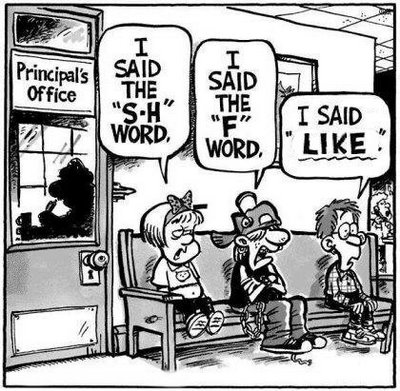
The "LIKE" phenomenon is taking over the nation. Kids today, mine included, cannot utter a sentence that doesn't include the word "LIKE". Fortunately, my kids respond to yelling, screaming, threats, and ultimately beatings, and their abuse of this four-letter word has abated somewhat. Sadly, "LIKE" spews forth as every other word from some of their friends, and that is NOT an exaggeration. I am at the point of not being able to understand these poor kids.
Somehow, I thought this was a new problem, but it seems that is not the case. Here is an article from the Columbus Dispatch dated 4/1/1998, written by William L. Bainbridge, who is Distinguished Research Professor at the University of Dayton and is President & Chief Executive Officer of SchoolMatch®, a Columbus based educational auditing, research, data firm:
One of our country's many talk show celebrities is CNN monarch Larry King. King has used his outstanding listening, questioning and communication skills to catapault himself into an exciting career as a premier television and radio interviewer.
In his spare time, the King of primetime question-and-answer shows has published several books focused on his communication secrets. In How to Talk to Anyone, Anytime, Anywhere, King advises his disciples not to rely on "nothing filler words." Words and phrases such as "you know," "as I said," "basically," "actually," "hopefully," and "whatever" are condemned by King as only slightly worse than "uh" and "um" in spoiling interpersonal communication.
Despite the best efforts of teachers and parents, the nothing filler word of the 1990's has been, and continues to be, the dreaded word LIKE. It must have started somewhere in a cheerleading camp and spread with rapid-fire speed through our schools with the help of the media beginning with the early 1980's song and movie, Valley Girl. The movie Clueless and its television adaptation currently being run ad nauseum on cable channels everywhere, unfortunately, presents an accurate picture of the misuse and overuse of this word.
Recently, our organization was conducting an "effectiveness audit" in an affluent suburban school district. The school system recorded incredibly high achievement in virtually all areas of the curriculum. During our team's site visit, we met with a group of community leaders including elected student leaders. The president of the senior class is an outstanding young lady with impeccable scholastic credentials. She has high scholarship examination scores and terrific grades. Her achievements and activities are most impressive.
After the session, several adults clustered in a private corner discussing this young person's "communication flaw," or what Larry King would call a "speaking tic." She seemed unable to speak more than five words without one of them being LIKE.
The session was videotaped. We reviewed the tape and, to no surprise, found sixty-four instances by actual count of this bright person cluttering her sentence with the word LIKE in less than four minutes: "You know LIKE I feel LIKE students LIKE have trouble LIKE selecting LIKE career awareness LIKE experiences." This student was given an opportunity to demonstrate her verbal skills before leaders of the community. In the minds of those in a position to help promote her aspirations, she undermined the serious concepts she was putting forward with a nothing word sentence splice. Moreover, her speech pattern seriously interfered with her attempts to discuss the issues and persuade the audience. What was she trying to accomplish? Had this tic been developed in the process of trying to be trendy with her peers? Some teenagers can turn this brainless language on and off at will. Others apparently have difficulty adjusting to the audience. Most are completely unaware of the extent to which listeners are irritated by this drivel.
Teens need to be encouraged to express themselves. But sentence fillers and splices, however, taken to an extreme, are not well-received in public presentations and interviews for employment, scholarships or college admissions.
If there is a parent or teacher of a teenager reading this who hasn't heard the LIKE phenomenon, consider yourself fortunate. For the rest of us, let's throw it out with the oral crutch "uh", "you know" and "like I said" of an older generation and try to promote better language skills and communication.
So, can we like stop this horrible like bad habit before we like kill somebody? Like DoctorDalai? Let's all like declare our homes like-free zones, so we can have some intelligent conversation, like we used to. You know?
3 comments :
I don't like get this like article!!
Your son
No kidding.
If I hear "like" one more time, I'm gonna loose it. :)
Marc
This "like" phenomenon has been around for about 20 years, along with the funny little mid-Pacific accent that so many teenage girls adopt. When my kids said "like" in a sentence I refused to listen, with the result that all of them now speak without meaningless "fillers". My wife, a nurse, has had to tell young trainees to speak properly with elderly charges who literally cannot understand this new meaningless drivel. If you read the New Yorker, you will discover that many celebrities, among others, will make remarks such as "I was, like" or "It was like...". It is interesting that Australia and the US now have some of the worst educational outcomes in OECD countries, and I find that comprehension among young people beggars belief.
Post a Comment